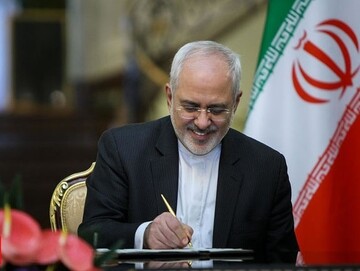Zarif also wrote in an article in Kuwait's Alrai Newspaper on Thursday that Hormuz is strategically important for international trade and energy, and about 15 million barrels of oil are transported every day from this region to consumers.
Zarif wrote that security and stability is critical to ensure communication with international markets. For centuries, the countries of the region have been ensuring the security of this region, which cannot be achieved without cooperation and interaction.
The current crisis situation "must make us believe that the region's urgent need" to establish sustainable security, which it has regrettably been deprived of, is to reach a common belief that safety is not achieved by buying and stockpiling huge amounts of weapons and signing military agreements with foreign powers who have posed the greatest threat to the entire region and support for the Zionist regime, but rather security depends on gaining confidence and reliance on the people and national capabilities and strengthening good-neighborly relations with the rest of the region.
He added that the region suffers from lack of comprehensive regional dialog in various fields, which leads to drying up of the roots of peace and urbanism forever.
"Our region needs more internal regional dialogue than a tendency towards accusations, the use of hostile and violent expressions, armed competition and the accumulation of weapons," Zarif added.
By understanding the future dangers, Iran has proposed two initiatives: the Regional Dialogue Forum and the Non-Aggression Act.
He stressed that now being aware of the threats and challenges, in order to save the region from the brink of destruction, "we feel the need for a new discourse more than ever before". "We believe that maintaining the security of the region is the collective responsibility of all the region's countries and are confident that through the participation of all countries in the Hormuz Basin, we can, in the midst of the turbulent waves, pilot the region to the coast of calm, progress and prosperity. Providing regional security is the primary responsibility of all countries of the region, and security must be indigenous and independent of foreign interference.
Taking the religious, cultural heritage, geographic and family ties into consideration, the fate of the people of the region has been intertwined and security cannot be fragmented and separated. Either everyone enjoys security or everyone is deprived of it.
On this basis, the "Hormuz Peace Initiative" was presented by Iran's President Hassan Rouhani in his speech at the UN General Assembly.
The Hormuz Peace Initiative, with the participation of Saudi Arabia, Iraq, Oman, the Emirates, Kuwait, Qatar, Bahrain, and Iran, has the necessary and sufficient potential to achieve comprehensive security throughout the region through regional dialog.
This initiative is based on established principles, including adherence to the purposes and principles of the United Nations; good-neighborliness; respect for the sovereignty and territorial integrity of states; non-violation of international borders; resolution of all disputes through peaceful means; rejection of the threat and resort to violence or participation in any alliance or military alliance against each other; non-interference in each other's internal affairs and foreign relations; respect for the sacred national, religious, historical symbols; mutual respect; mutual interests; and equal status of all countries of the region.
The initiative is also after obtaining high goals, including the promotion of peace; stability, progress and welfare for all countries and people of the region; mutual understanding and peaceful and friendly ties; cooperation in eradicating terrorism, extremism and sectarian conflicts; handling tensions and resolving all differences and disputes by peaceful means and through dialogue; support for communication and preventive warnings; provision of collective energy security; freedom of navigation and shipment of oil and other resources; support for the environment; and expansion of interaction, trade, and investment at different levels and fields among the people, governments, and private sectors.



Your Comment